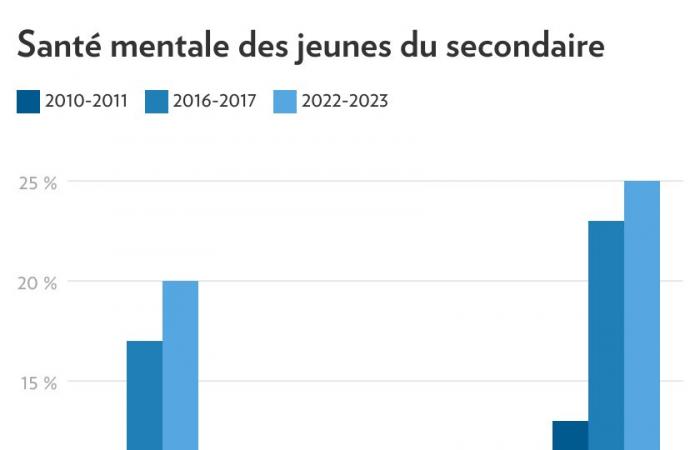Teenagers are not doing very well: diagnoses of anxiety disorders, depression and eating disorders are on the rise among high school students, their self-esteem is declining. And their cell phone use is increasing, to the point of depriving them of hours of sleep.
Posted at 10:25 a.m.
Updated at 11:21 a.m.
Between 2010-2011 and 2022-2023, there was a significant increase in mental disorders confirmed by a doctor among young people in high school in Quebec. One in five young people have been diagnosed with an anxiety disorder. Among girls, this proportion rises to 29%, reveals a survey on the health of young people carried out by the Institute of Statistics of Quebec (ISQ).
Thus, approximately 6% of high school students have taken medication for symptoms of anxiety or depression (8% among girls; 3.8% among boys), and 16% have taken it for symptoms of ADD/ADD. ADHD (12% in girls; 19% in boys).
Self-esteem is also plummeting. In 2010-2011, one in five young people said they had “high” self-esteem. This proportion was 12% in 2022-2023 (7% for girls, 16% for boys).
More screens, less sleep
Interest in cell phones continues unabated. Whether it’s a school day or not, a quarter of high school students usually spend 4 hours or more per day in front of a screen for communications and leisure.
This proportion is higher among girls (28%) than among boys (23%).
Sleep is consequently reduced. Just under half (48%) of high school students sleep less than the recommended amount during a school week.
Those who spend more time on a screen are “proportionally more likely than those who spend less time to have fewer hours of sleep than recommended,” observes the ISQ.
Love relationships tinged with violence
Young people in secondary school have sex later, the ISQ study also shows.
The proportion of students who have had a consensual sexual relationship at least once in their life increased from 37% in 2010-2011 to 30% in 2022-2023.
Four out of ten high school students said they had had a romantic relationship in the year preceding the ISQ survey. A similar proportion (37%) said they had experienced some form of violence in the context of this relationship, whether physical, psychological or sexual. One in five young people admitted to inflicting such violence.
The ISQ study was carried out among 70,825 high school students from 483 public or private schools across Quebec, French-speaking or English-speaking, from the four corners of Quebec.
In a first part of the study released at the beginning of the week, we learned that young people do less physical activity than before, but that they also consume less cannabis, alcohol, cigarettes, sugary drinks and junk food.







